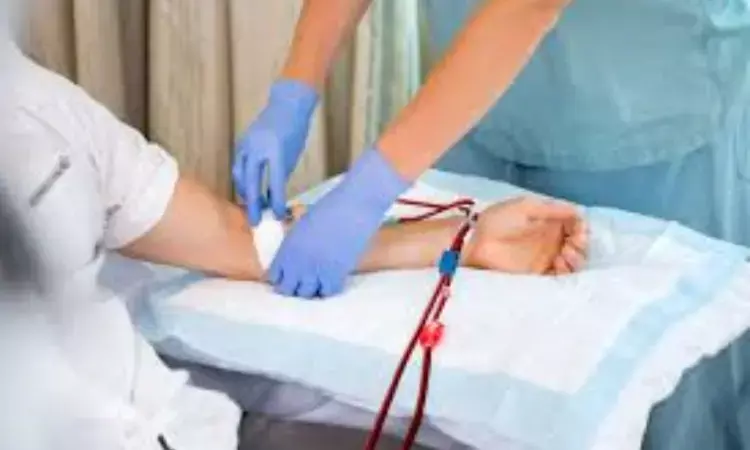- Home
- Medical news & Guidelines
- Anesthesiology
- Cardiology and CTVS
- Critical Care
- Dentistry
- Dermatology
- Diabetes and Endocrinology
- ENT
- Gastroenterology
- Medicine
- Nephrology
- Neurology
- Obstretics-Gynaecology
- Oncology
- Ophthalmology
- Orthopaedics
- Pediatrics-Neonatology
- Psychiatry
- Pulmonology
- Radiology
- Surgery
- Urology
- Laboratory Medicine
- Diet
- Nursing
- Paramedical
- Physiotherapy
- Health news
- Fact Check
- Bone Health Fact Check
- Brain Health Fact Check
- Cancer Related Fact Check
- Child Care Fact Check
- Dental and oral health fact check
- Diabetes and metabolic health fact check
- Diet and Nutrition Fact Check
- Eye and ENT Care Fact Check
- Fitness fact check
- Gut health fact check
- Heart health fact check
- Kidney health fact check
- Medical education fact check
- Men's health fact check
- Respiratory fact check
- Skin and hair care fact check
- Vaccine and Immunization fact check
- Women's health fact check
- AYUSH
- State News
- Andaman and Nicobar Islands
- Andhra Pradesh
- Arunachal Pradesh
- Assam
- Bihar
- Chandigarh
- Chattisgarh
- Dadra and Nagar Haveli
- Daman and Diu
- Delhi
- Goa
- Gujarat
- Haryana
- Himachal Pradesh
- Jammu & Kashmir
- Jharkhand
- Karnataka
- Kerala
- Ladakh
- Lakshadweep
- Madhya Pradesh
- Maharashtra
- Manipur
- Meghalaya
- Mizoram
- Nagaland
- Odisha
- Puducherry
- Punjab
- Rajasthan
- Sikkim
- Tamil Nadu
- Telangana
- Tripura
- Uttar Pradesh
- Uttrakhand
- West Bengal
- Medical Education
- Industry
Live music may improve physiological and psychological indices in pediatric hemodialysis patients

Live music has been found to increase general well being of chronically ill pediatric patients.But the effect of music on children with kidney disease has not been evaluated.
Researchers have found in a new study that music may improve physiological and psychological indices in pediatric hemodialysis patients.
The new study has been published in the Journal of Nephrology.
Engaging chronically ill pediatric patients with live music has been associated with improved physiological and psychological well-being. However, the impact of live music during hemodialysis treatments has yet to be assessed, in particular in pediatric patients. This study focuses on the effects of live music therapy during chronic hemodialysis treatment.
An experimental design with randomization was applied in this pilot study. A total of 16 participants with kidney failure requiring hemodialysis participated in the study. In addition to their usual care (N = 96 measurements), the patients in the experimental group listened to 30 min of live music during their hemodialysis procedure. The control group was observed for 30 min while they received their usual care (N = 96 measurements) and were exposed to a series of animated videos that were broadcast in the common room where hemodialysis treatment is performed. Data concerning heart rate, blood pressure, and levels of depression and anxiety were collected for analysis.
RESULTS
Live music significantly reduced heart rate (p < 0.05), systolic pressure (p < 0.05) and diastolic pressure (p < 0.05). The findings also highlighted that, after listening to live music, there was a significant decrease in anxiety and depression (p < 0.05).
In the small study sample, live music improved some physiological and psychological indices in pediatric hemodialysis patients. Further research evaluating larger samples with longitudinal follow-up is required.
Reference:
Silletti, Antonella, et al. "Effects of Live Music During Hemodialysis Treatments in Pediatric Patients." Journal of Nephrology, 2023.
Keywords:
Live music, improve, physiological, psychological, indices, pediatric, hemodialysis, patients, Journal of Nephrology
Dr. Shravani Dali has completed her BDS from Pravara institute of medical sciences, loni. Following which she extensively worked in the healthcare sector for 2+ years. She has been actively involved in writing blogs in field of health and wellness. Currently she is pursuing her Masters of public health-health administration from Tata institute of social sciences. She can be contacted at editorial@medicaldialogues.in.
Dr Kamal Kant Kohli-MBBS, DTCD- a chest specialist with more than 30 years of practice and a flair for writing clinical articles, Dr Kamal Kant Kohli joined Medical Dialogues as a Chief Editor of Medical News. Besides writing articles, as an editor, he proofreads and verifies all the medical content published on Medical Dialogues including those coming from journals, studies,medical conferences,guidelines etc. Email: drkohli@medicaldialogues.in. Contact no. 011-43720751


